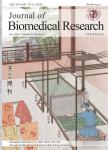Clinical features of multiple myeloma patients with isolated extramedullary relapse
Clinical features of multiple myeloma patients with isolated extramedullary relapse作者机构:Department of HematologyFirst Affiliated Hospital of Nanjing Medical UniversityJiangsu Province Hospital
出 版 物:《The Journal of Biomedical Research》 (生物医学研究杂志(英文版))
年 卷 期:2018年第32卷第4期
页 面:264-269页
核心收录:
学科分类:0710[理学-生物学] 1002[医学-临床医学] 100214[医学-肿瘤学] 10[医学]
基 金:supported by Foundation of NationalNatural Science Foundation of China(81241074,81071946 and 81302040) Natural Science Foundation of Jiangsu Province(BK2012485) Jiangsu Province's Medical Elite Program(RC201148) a Project Funded by the Priority Academic Program Development of Jiangsu Higher Education Institutions the Program for Development of Innovative Research Team in the First Affiliated Hospital of NJMU Clinical Research Program from Health Ministry of China(Key project 2010to 2012) Scientific Research Program for Public Interests from the Health Ministry of China(No.201202017)
主 题:multiple myeloma extramedullary clinical feature prognosis
摘 要:This study sought to analyze the clinical features and prognosis of multiple myeloma with isolated extramedullary relapse and with the absence of systemic *** clinical features and outcome were retrospectively analyzed in six multiple myeloma *** patients had secretory multiple myeloma at *** relapsed,the dissociation between medullary and extramedullary response was *** serum or urine monoclonal component was extremely low or *** plasma cells in bone marrow were 〈5%.All patients received new targeted therapies(thalidomide or bortezomib) before extramedullary *** is difficult to achieve second remission for *** in those showing response,the duration of response was extremely *** median of overall survival from diagnosis and from extramedullary relapse was 19 months and 6 months,*** overall survival was significantly shorter compared to the patients without extramedullary involvement(84 months,P= 0.001).These patients exhibited a special and rare relapse *** with this relapse pattern were resistant to current therapies,including novel targeted agents and associated with poor prognosis.



